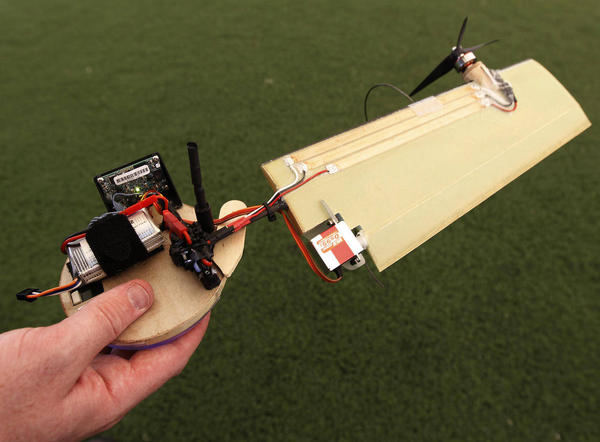Lockheed Martin’s Intelligent Robotics Laboratories has spent the last five years developing an unmanned craft to replicate the motion of maple tree seeds, whirring softly to the ground like silent one-winged helicopters. The device, called the Samarai, is scheduled to make its public debut next week at the AUVSI conference in Washington.
Engineers gave The Associated Press a preview Wednesday at an indoor soccer field in Southampton, New Jersey. The Samarai is about a foot long, and has just two moving parts plus a camera. It can be controlled by a remote control or by an app on a tablet computer. On Wednesday, engineers Dave Sharp and Craig Stoneking piloted a Samarai, which in flight looked like a translucent blur around a pair of blue and red lights. They moved it from the soccer field to the ceiling some 30 feet above and across the field.
 By remote control, the flight was steady. With the easier-to-use app, it twirled around a bit, not unlike a maple seed. That, Stoneking said, will be fixed in the future. The idea isn’t brand new. Students at the University of Maryland built a smaller maple seed-inspired flyer a few years ago. Bill Borgia, director of the Lockheed Martin lab, said it could be useful for the military and police — as well as his lab’s work on other devices.
By remote control, the flight was steady. With the easier-to-use app, it twirled around a bit, not unlike a maple seed. That, Stoneking said, will be fixed in the future. The idea isn’t brand new. Students at the University of Maryland built a smaller maple seed-inspired flyer a few years ago. Bill Borgia, director of the Lockheed Martin lab, said it could be useful for the military and police — as well as his lab’s work on other devices.
Soldiers could carry the devices in their backpacks, launch them by throwing them like boomerangs and use real-time images from cameras to find out what might be around the next corner. They could be dropped from plane to collect ground-level images instead of just the aerial images used now. Soldiers or police officers could use them even to get a look inside buildings. Unlike most drones used by the military, these can hover in place like a helicopter and take off vertically in tight spaces.
Borgia said they could come in a variety of sizes and be produced cheaply by 3D printing, which uses layers of plastic to create objects.
Putting a motor on a piece of plastic that shaped like a maple seed and getting it to fly was relatively easy, Borgia said. Learning to control the natural movements was the challenge. Borgia said the lessons learned trying to harness and mimic a natural design have already been used in some of his lab’s other projects — robots that behave like human hands or move about like insects.
Lockheed officials wouldn’t say how much it cost to develop or which government agencies helped fund the research.
Source: Associated Press



